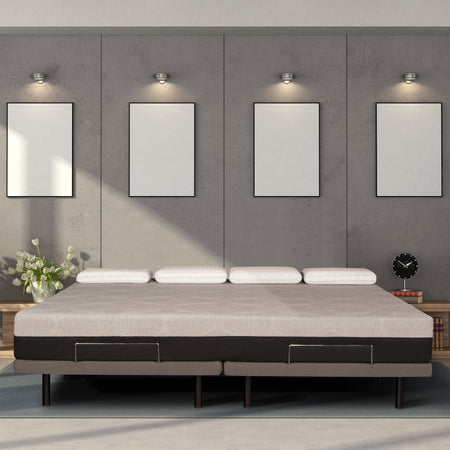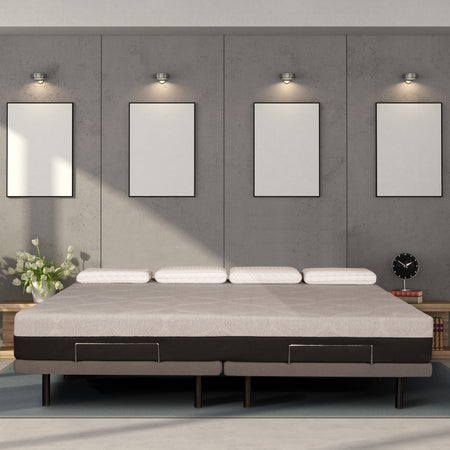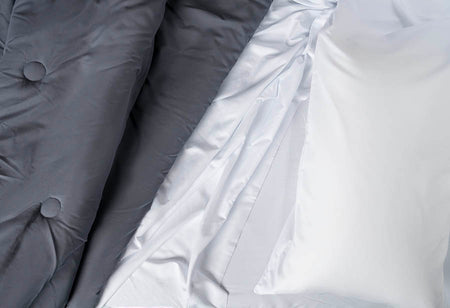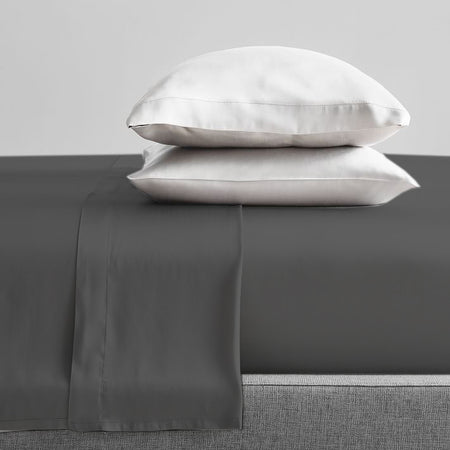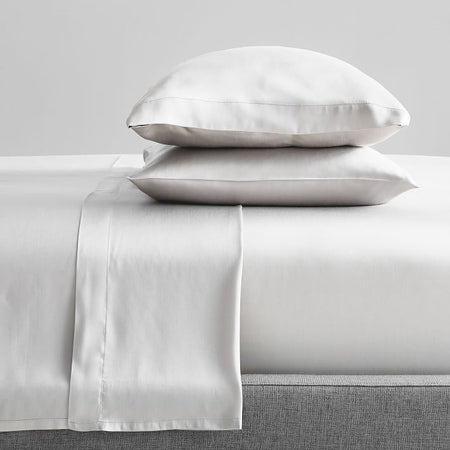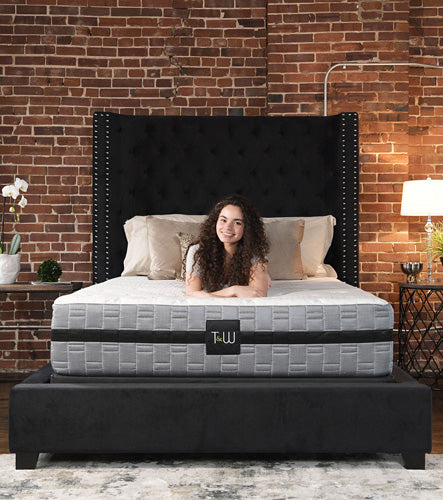It’s a familiar scene. You’re lying in bed, exhausted but restless. So, you flick on the TV, open YouTube, or let a podcast run to quiet the racing thoughts or fill the silence. Before you know it, you’ve drifted off while a late-night talk show host or your favorite television series hums in the background. For many people, sleeping with the TV on feels like the only way to get a good night’s rest. But is it really helping? Or is it quietly sabotaging your sleep quality and long-term health?
Let’s explore what the science says about TV shows, background noise, and sleep, along with healthier alternatives that can help your mind and body truly recharge.
Is It a Good Idea to Sleep with the TV On?
There’s been a lot of research into how the technology we use every day affects our sleep, stress levels, weight, and even our heart health. From cell phones to laptops to televisions, one thing is clear: our screens don’t just entertain us; they directly influence our body’s ability to rest.

Numerous studies show that exposure to artificial light at night can interfere with melatonin production, delay circadian rhythms, and cause sleep disturbances. That’s why experts probably say you should avoid watching TV, scrolling social media, or using your phone right before bed.
While you might feel like the TV helps you fall asleep, researchers warn that the quality of sleep you’ll get is often poor. In fact, studies have linked falling asleep with the TV on to fragmented sleep, reduced rapid eye movement (REM) sleep, and long-term risks like high blood pressure and even heart disease.
The Science of Sleep and TV Exposure
Your body doesn’t just “switch off” when you go to bed, it follows a carefully timed series of steps to repair, recharge, and reset. Light, sound, and rhythm all play a role in keeping this process on track. When you fall asleep with TV shows or background noise running, you’re introducing signals that can confuse that system. Here’s how:
Circadian Rhythm: Your Internal Clock
Your circadian rhythm is the 24-hour cycle that regulates sleep, alertness, and hormone production. It’s highly sensitive to light and dark. When the sun sets, darkness signals your brain to release melatonin, the hormone that helps you fall asleep. When the sun rises, light suppresses melatonin, so you wake up feeling refreshed.
But when artificial light from TV shows or cell phones enters the mix, it confuses your body. Even light through closed eyelids can signal your brain to stay partially awake, disrupting your body's natural rhythms.
Blue Light and Melatonin
One of the biggest culprits is blue light emitted by TVs, laptops, and smartphones. Blue light is particularly powerful at suppressing melatonin, delaying sleep onset, and pushing your circadian rhythm out of sync.
Research shows that evening exposure to blue light keeps people awake longer and reduces the amount of REM sleep, which is critical for memory, learning, and emotional health.

Sound and Sleep Disturbances
It’s not just light that matters. Sound plays a big role, too. Even if you don’t fully wake up, background TV noise can cause “micro-arousals,” tiny brain activity shifts that make your sleep lighter and less restorative.
This is why you might wake up in the middle of the night, or feel oddly tired despite logging what seemed like enough hours of sleep. Over time, disrupted REM sleep can negatively affect mood, memory, and concentration.
Stress, Blood Pressure, and Heart Health
Your nervous system is also sensitive to unpredictable noises. A sudden laugh track, action scene, or commercial can activate your sympathetic nervous system, the “fight-or-flight” response. This can elevate heart rate and blood pressure, even during sleep.
Chronic sleep disturbances caused by background TV exposure have been linked to increased risks of health problems including high blood pressure, weight gain, and heart disease. In other words, what feels like a harmless nightly ritual could be working against your long-term health.
Why Do People Sleep with the TV On?
If sleeping with the TV on is so disruptive, why do so many people do it? The reasons are deeply human, and they make sense.
-
Racing thoughts: For people with busy minds, silence can make stress louder. TV shows or YouTube videos can provide just enough distraction to quiet their anxiety.
-
Loneliness: A familiar voice in the background can ease feelings of being alone, especially at night.
-
Comfort and habit: If you’ve always fallen asleep to TV shows, the routine itself becomes soothing.
-
Middle-of-the-night awakenings: Some people find that leaving the TV on helps them fall back asleep faster if they wake in the middle of the night.
The Trade-Off: Short-Term Relief vs. Long-Term Consequences
The comfort of TV may help you fall asleep faster, but the cost shows up in the quality of your rest.
-
Short-term effects: More awakenings, lighter sleep, reduced REM sleep, grogginess.
-
Long-term effects: Ongoing sleep debt, higher risk of weight gain, increased chance of developing high blood pressure, and a greater likelihood of heart disease.
When you’re sleep-deprived, your body doesn’t just feel tired. It struggles to regulate blood sugar, appetite hormones, and stress responses. That’s why chronic screen time before bed can negatively affect your mental and physical health.

Healthier Alternatives to Sleeping with the TV On
If the TV feels like your lifeline at night, don’t worry. There are healthier substitutes that still offer comfort without sabotaging your circadian rhythm.
-
Podcasts or audiobooks: Audio without a glowing screen provides background noise while preserving melatonin production.
-
Quiet music: Gentle, instrumental tracks can relax the nervous system.
-
White noise machines: A steady, predictable sound masks disruptive noises without jolting you awake.
-
Sleep-friendly apps: Many offer nature sounds, guided meditations, or ASMR and are great for improving your sleep.
-
Set a sleep timer: If you must use the TV, set it to turn off automatically after 30–60 minutes. This way, you avoid hours of sleep under light and noise exposure.
These alternatives help you fall asleep while protecting REM sleep and giving your brain the deep rest it needs.
How Much Sleep Do You Really Need?
The recommended amount of sleep for most adults is 7 to 9 hours per night. Anything less than that, especially over time, creates a sleep debt that your body struggles to repay.
If you often wake up feeling unrested, need caffeine to get through the day, or find yourself dozing off while watching TV, chances are you’re sleep-deprived. And when you pair chronic fatigue with nightly screen exposure, the cycle only worsens.
Creating the Right Sleep Environment
Falling asleep easily and staying asleep is about more than avoiding screens. The environment you sleep in matters just as much.
-
Supportive mattress: The foundation of quality sleep is the surface you sleep on. A high-quality mattress keeps your spine aligned, eases pressure points, and minimizes tossing and turning, allowing your body to reach deep, restorative sleep.
-
Limit screen time: Power down TVs and cell phones at least 30 minutes before bed to protect your circadian rhythm.
-
Blackout curtains: Block external light so your body stays in sync with its natural sleep-wake cycle.
-
Cool temperature: Aim for 65–68°F to help your body settle into rest more easily.
-
Bedroom boundaries: Keep your bedroom a sanctuary for sleep and intimacy, not late-night scrolling or watching TV shows.
Choose Rest Over Routine
When it comes to sleep, everything starts with your mattress. You can dim the lights, lower the temperature, and limit screen time, but your body won’t get the rest it needs if your mattress isn't doing its job. An unsupportive mattress can leave you tossing and turning, create pressure points, and prevent you from reaching the deep, restorative sleep stages that keep you healthy.
A well-made mattress, on the other hand, gives your body the support and comfort it craves. It aligns your spine, reduces disturbances, and helps you wake up refreshed instead of drained. In many ways, your mattress is the foundation of your overall health, because better sleep means better mornings, sharper focus, and more energy for the day ahead.
At the Bedding Mart, you’ll find mattresses built to give you that solid foundation. Explore the collection today and discover how the right mattress can transform not just your nights, but your life.


